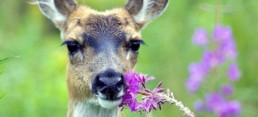OH, DEER! Don’t Eat That!
I wish you could have seen my garden: 196 roses, over 150 varieties of hostas, and gorgeous Annabelle hydrangeas. Then the deer arrived. Within one growing season, they stripped my garden of every bloom. It was heartbreaking.
A few facts about deer: They are herbivores, meaning they only consume plants, and if they are hungry enough, they will eat any plant in sight. Moreover, a deer eats an average of 12-14 pounds of vegetation every day! And deer have a hard upper palate (a hard surface of gristle) allowing them to chomp down on rose thorns without a care in the world.
Deer love to procreate. I’ve had two sets of twin fawns born in my garden, which they now see as their homeplace. A doe can give birth to one fawn its first year of life; two to four every year from then on. Therefore, over their fifteen to twenty-year lifespan, a doe could have forty or more offspring. And with no natural predators, they’re the gift that just keeps on giving in Middle Tennessee.
Fences do not stop deer either. They can jump 8-12 feet and get right into your garden. Deer have a strong sense of smell. From several hundred yards away, they can whiff the sweet fragrance of flowers and come right in for a snack. Plants with a high water content are their favorites – roses, hostas, daylilies, rhododendrons – all the principal plants we like in our gardens.

So how do I keep deer out of my garden? Here are some tips.
- Spray flowers and shrubs with a deer repellent such as Deer Be Gone, Liquid Fence, or Bonnex. Re-spray after rain.
- Make your own deer repellent. Use 1 raw egg, ½ cup milk, 1 tablespoon of dish detergent, one gallon of water. Re-spray after rain.
- Get a motion detector. Some spray water; some emit noise. Both work.
- Keep your garden clean. Acorns, rotting fruit, and leaves are snack-bars for deer.
- Sorry but no plant is 100% deer-proof. If they’re hungry enough, they will eat anything.
- A natural remedy that I and many area rosarians have found to be the most effective of all: IRISH SP
 RING SOAP You think it smells bad? Deer think it’s horrible. Hope it works as well for you as it does for us!
RING SOAP You think it smells bad? Deer think it’s horrible. Hope it works as well for you as it does for us!
**Put a full bar in an old stocking and hang it about four feet from the ground**
I have included a list of plants that have proven to be the most resistant to deer in our area. They are available at local nurseries or box stores. You will notice that the fragrances of these plants are much stronger and spicier than the sweet fragrances deer prefer. You will also notice that many are herbs. Maybe that’s one reason herb gardens are so popular in this area aside from the edible gardening aspect.
It’s a fact. Deer are a part of gardening in Middle Tennessee. However, you can be successful in your garden, if you are persistent and plant the best plants for your location.
Here is a list of Plants That ARE THE MOST DEER RESISTENT
-
- Daffodils
- Forsythia
Lilac - Crepe Myrtle
- Marigolds
- Zinnias
- Iris
- Lavender
- Snapdragons
- Hellebores
- Virginia Bluebells
- Hyacinths
- Columbine
- Ferns
- Heuchera
- Ajuga
- Lambs Ear
- Perennial Hibiscus
- Cleomes
- Cosmos
- Gloriosa Daisies
- Lantana
- Nicotiana
- 4 o’clocks
- Money Plants
- Dames Rocket
- Dianthus
- Ornamental Sages
- Verbena Bonariensis
- Phlox
- Goldenrod
- Allium and Chives
- Basil
- Rosemary
- Oregano
- Sage
- Mint
- Catmint
- Thyme
- Russian Sage, Pineapple sage
- Lemon Balm
- Rue
- Moon Flowers and Morning Glories
- Rudebeckias – Black Eyed Susans
- Mexican Daisies –Tithonia
- Perennial Begonias
- Poppies – poisonous
- Astilbe
- Monarda – anything with a square stem
- Gladiolas
- Lily of the Valley, Foxgloves, Delphinium – poisonous
- Red Hot Poker
- Peonies
- Cannas
- Sedum
- Echinacea
- Coreopsis
- Asclepia
- Euphorbia
- Ornamental Grasses
- Achillea – yarrow
- Gaillardia
- Penstamon
- Salvia
- Shasta Daisy
- Ageratua
- Yucca
- Wisteria
- Artemisia, Dusty Miller
- Chrysanthemum
- Buddleia
Lynne Wallman
Lynne is a Nashville native. She has been a dynamic member of the Nashville Gardening Community for many years. Currently she is an active member of the Herb Society, Gateway Acres Garden Club, Oak Valley Garden Club, and Fashion Show Chair for HSMT. She is Past President of the Horticultural Society, the Perennial Plant Society, as well as the Garden Department of the Woman’s Club of Nashville. In addition to her love of horticulture, Lynne is a successful Realtor in the Nashville area.
